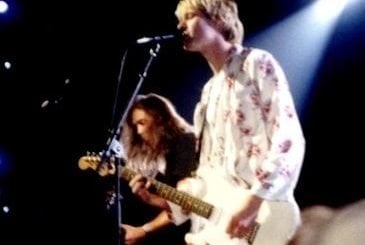Paper Cuts by Nirvana Lyrics Meaning – The Raw Scream of Alienation and Confinement
Lyrics
She’d push food through the door
I crawl towards the crack of light
Sometimes I can’t find my way
Newspapers spread around
Soaking all that they can
A cleaning is due again
A good hosing down
The lady whom I feel maternal love for
Cannot look me in the eyes
But I see hers and they are blue
And they cock and twist and masturbate
Why? I said so
I said so
I said so
Nirvana, nirvana, nirvana, nirvana
Black windows of paint
I scratch with my nails
I see others just like me
Why do they not try to escape?
They bring out the older ones
They point at my way
They come with their flashing lights
And take my family away
And very later I have learned to
Accept some friends of ridicule
My whole existence is for your amusement
And that is why I’m here with you
To take you me with
Your life
Nirvana, nirvana, nirvana, nirvana
Nirvana, nirvana, nirvana, nirvana
In the garden of grunge, Nirvana remains a perennial, looming figure, akin to an oak with roots tangled deep into the soil of modern music. Amongst the treasure trove of angst-driven anthems, lie cryptic scriptures, often eclipsed by the gleaming shadow of hits like ‘Smells Like Teen Spirit’. ‘Paper Cuts’ is one of those obscured gems, a track from their 1989 debut album ‘Bleach’, which echoes with the raw, unfiltered anguish typical of the band’s early works.
Unlike the band’s more mainstream offerings, ‘Paper Cuts’ does not clothe its narrative clarity. Its visceral lyrics and guttural delivery create a vivid tapestry of pain and seclusion, beckoning listeners into a wretched room of interpretation. But what lurks beneath Kurt Cobain’s moans and throttled guitar riffs? Let’s peel back the curtain on this graffiti-splattered wall to unveil the hidden themes and stark emotional resonance layered within the song.
A Glimpse into a Grim Domesticity
The song invites us into an unsettling domestic scene, not of warmth and nurturing, but of isolation and mechanized care. Lyrically, we’re presented with a tableau where food is merely a survival transaction, pushed through a door, suggesting a lack of human connection. The protagonist of this narrative exists almost like a creature, crawling towards fragments of light in a world that is otherwise shrouded in darkness.
It paints an image reminiscent of an animal in captivity, hinting either at a literal imprisoned state or a metaphorical cage representing emotional neglect. The detailed imagery of newspapers soaking up…what? Spilled life, perhaps, or the overflow of a mundane existence, reinforces this sense of oppressive confinement.
The Intimacy of Self-Vectorization
In one of the song’s more disturbing moments, Cobain references maternal love, warped and mutated into something barely recognizable. It’s an uncomfortable dissection of the mother-child bond when he describes the maternal figure who can’t bear to look him in the eye. Instead, there is an aggressive sexualization of the gaze— ‘they cock and twist and masturbate’— which twists intimacy into something that sours upon the tongue.
This uncomfortable juxtaposition may signal a deeper dysfunction, an injury imparted by those meant to provide care. The overt vulgarity throws us off-balance, compelling us to confront the chasm between society’s idealized maternal portrait and the brutal reality for some.
A Call to the Dispossessed
When the chorus chants ‘Nirvana, Nirvana’, it’s as if Cobain is summoning the disaffected. It’s more than just the name of the band; it’s the concept of an ultimate freedom juxtaposed against the farcical idea of freeing oneself from the muck of his described existence. It’s a snarl, a laugh, a desperate cry for release from suffering that becomes almost meditative in its repetition.
This invocation résonates like a dogged attempt to transcend the mire, even when the barriers to that nirvana seem inviolable. For countless listeners, it’s a refrain that encapsulates the turbulence of youth and the piercing need to be understood and to break free from the emotional constraints of our circumstances.
Escapism Denied: A Cruel Reality
Not just the narrator is imprisoned – ‘I see others just like me’ – linking individual suffering to a collective experience in the claustrophobic ‘painted black windows’. Yet, these others don’t attempt to escape. This bleak acceptance of fate is chilling as it reflects deeper questions about human psychology and our capacity for complacency within crippling conditions.
When the ‘older ones’ are brought out and the ‘flashing lights’ take his family away, it evokes a sense of dismantlement and disruption, not unlike a raid, the tearing away of familiar faces one by one. This creates a haunting image of personal loss, the decay of community, and the dissolution of family – all unfolding against the protagonist’s silent, impotent backdrop.
The Resonance of Rawness: Memorable Lines that Haunt
‘My whole existence is for your amusement, and that is why I’m here with you’ – could be interpreted as Cobain’s indictment of the voyeurism of fans and media or a broader societal judgment. Each listener might engrave their interpretation, but the line unequivocally seethes with a bitterness toward being perceived as mere spectacle, dehumanized and display-bound.
The resignation that tinges every word of ‘Paper Cuts’ resonates with the anthemic nihilism of a generation. Cobain hurls these lines not just as lyrics but as stark assertions of existence and resistance, etching into the collective memory of those who seek empathy within the cacophony of their own misgivings.








